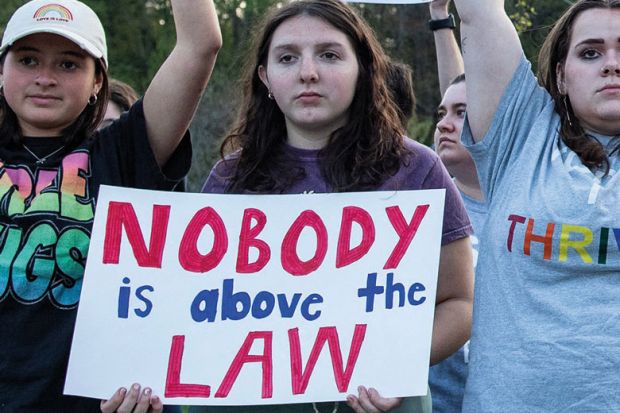The leader of a small, religiously affiliated campus in New Hampshire has defended the decision to host a nationally televised forum with the former US president, Donald Trump, despite facing protests from staff and students.
Saint Anselm College agreed to host Mr Trump for an on-stage interview with the CNN network that occurred just a day after a New York jury found he had sexually assaulted an advice columnist, E. Jean Carroll, in the mid-1990s.
Mr Trump, a frequent and enthusiastic critic of US higher education, took the hour-long opportunity to put forth a series of false claims on policy and political matters to the point where CNN’s own media reporter called it a “spectacle of lies” and “shameful antics” that the network should not have aired.
Some Saint Anselm students and higher education advocates also questioned the decision to hold the event, the first national question-and-answer session for Mr Trump since declaring his candidacy for the 2024 presidential election.
Several students at the private Catholic school protested outside the on-campus venue, the Koonz Theater in the Dana Centre, and joined faculty at a “democracy teach-in”, highlighting Mr Trump’s record of promoting political disinformation and societal violence.
Some national higher education voices also joined the chorus of condemnation. “I cannot understand why St Anselm’s would participate,” Erin Hennessy, a higher education strategist and former chief spokesperson for the American Council on Education, said on Twitter. “I know the response is ‘they’re just the location’ – I’ve written that response plenty – but it also becomes ludicrous in this situation.”
Saint Anselm has argued that it was following in a storied tradition of US colleges and universities – usually smaller and lesser-known campuses, including Saint Anselm itself – of hosting US presidential debates. “Saint Anselm has a long history of participation in the democratic process, with every major candidate for president since the 1960 election visiting the college,” it said in announcing the event.
Michael Strysick, the chief communication and marketing officer at the University of North Carolina at Asheville, agreed. Dr Strysick helped to organise the 2012 vice-presidential debate between Joe Biden and Paul Ryan at Centre College, advising several other institutions on similar events. He sees them as overwhelmingly beneficial.
“In each and every case,” he said, “I remain convinced that these were worthy investments of time and resources, chiefly because of the educational component it provided for voters, as well as the front-row seat it offered to students, faculty and staff to see democracy at work.”
The Trump event at Saint Anselm, however, was different in being a single-candidate “town hall”-style forum, rather than a debate, and involved questions from a pre-selected audience consisting largely of pro-Trump voters.
Saint Anselm’s president, Joseph Favazza, initially gave the idea a full-throated endorsement, saying in a note to the campus community that he was eager to serve as host. “Democracy depends on an educated citizenry,” he wrote. “Here at Saint Anselm, we are proud to play an important and unique role in this regard.”
Later, however, in comments to the student newspaper, The Saint Anselm Crier, he was more equivocal. “By putting him through the paces of a town hall, we keep him in the political process rather than allowing him to claim victimhood for being shut out of it,” Dr Favazza said of Mr Trump. “But, given his reputation, we understand that this is a risk.”




